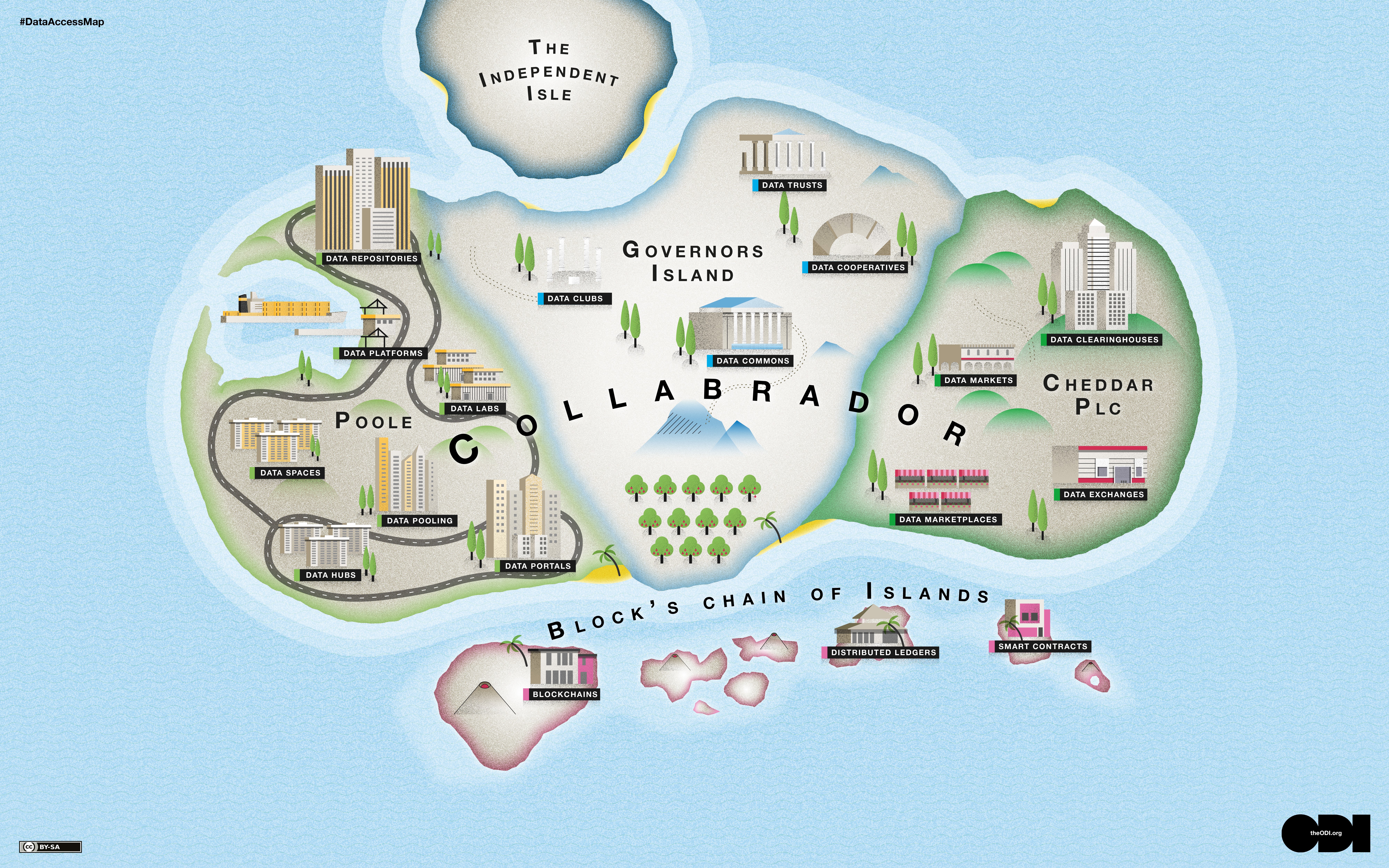
Our thinking around data institutions has developed since we published this article. To see our latest thinking on what data institutions are, read our article 'What are data institutions and why are they important?'
What defines a data institution, and what constitutes one? Our CEO Jeni Tennison answers this question, and shares how we’ve been exploring this type of access model
At the ODI, we have been exploring a number of ways of increasing access to data while retaining trust.
In 2019, we, in partnership with the UK's Office for AI, particularly focused on exploring one model for increasing well-governed access to data: data trusts. As we have learned more about them and experimented with applying data trusts in real cases, two things have become clear:
- Using the term ‘data trust’ implies a model where trustees take on a fiduciary duty (a legal responsibility of impartiality, prudence, transparency and undivided loyalty) on behalf of others for how data is shared. Using the term when that isn't the case dilutes the concept.
- Lots of people and organisations want to be involved in sharing data, but don't want to adopt a model that puts in place this type of relationship.
This means we need to explore data access models other than data trusts, and need an alternative term to use for these models.
Work with us on data institutions
Exploring access models
We developed a map of different data access models that people talk about and use, ranging from technical concepts like APIs through to governance approaches like data access boards. This map built on and expanded the classification done by GovLab on Data Collaboratives. They define Data Collaboratives as:
Data Collaboratives are a new form of collaboration, beyond the public-private partnership model, in which participants from different sectors — in particular companies — exchange their data to create public value.
In our map, we explored models outside this definition, including those involving individuals sharing personal data, collaborations that don't involve the private sector and those whose primary purpose is economic value for those involved.
Central to the map, and where we put data trusts, is "Collabrador": an island of access models with some common features:
- they are set up for many-to-many collaboration, rather than one-to-one (eg research partnerships) or one-to-many (eg open data)
- they involve some kind of independent intermediary or broker to facilitate the collaboration
- they are designed to be long lasting, rather than focused, for example, on a particular analysis or prize or challenge activity

Collabrador has three regions:
- Poole contains terms for models that emphasise collecting data (or data about data) together in one place, such as data portals and data spaces
- Cheddar Plc contains terms for models that emphasise brokerage and sale of data, such as data marketplaces and data exchanges
- Governors Island contains terms for models that emphasise good governance over sensitive or contested data, including data trusts and data cooperatives
The concept of 'data institutions'
We have started calling the models on Governors Island data institutions. This draws on a dictionary definition of "institution" as:
an organization, establishment, foundation, society, or the like, devoted to the promotion of a particular cause or program, especially one of a public, educational, or charitable character
Picking that apart, data institutions are:
- ‘an organization, establishment, foundation, society, or the like’ – a long-lived and legally recognised arrangement that provides reliability and makes up front costs of establishing the collaboration worth the investment; operating independently of data providers and beneficiaries and therefore able to balance conflicting interests
- ‘devoted to the promotion of a particular cause or program’ - providing access to data to support a particular purpose or mission; the clarity and focus of that purpose helps when making decisions about who should gain access to do what
- ‘especially one of a public, educational, or charitable character’ – frequently with a collective, social or public good purpose, which might include redressing power imbalances, promoting competition, or supporting economic activity as well as more traditionally social good purposes such as improving health outcomes
Data institutions come in different shapes and sizes. The types of data institution on the map are:
- Data clubs, inspired by members clubs, enable organisations to share data with other organisations who are part of the club.
- Data cooperatives, inspired by mutual organisations, enable members of the cooperative (organisations or people) to share data with others, with data governance decisions made by those members.
- Data trusts, inspired by legal trusts, enable people or organisations to share data with others, with data governance decisions made by ‘trustees’ with fiduciary responsibilities (ie it’s their legal duty to always put their client’s best interests ahead of their own)
- Data commons, inspired by the management of common pool resources, help organisations or people collaborate to create and maintain shared data assets.
We know that lots of people, all over the world, are experimenting with these and other institutional models to support increased access to data. The list above is not an exhaustive one.
As we explored this term further, we realised that ‘data institutions’ might also be used in other contexts.
- There are other institutions that are essential in making data and the data economy work for everyone, including regulators, professional bodies, consumer advocacy organisations, funders, auditors, insurers and so on. These need to be part of our institutional framework for a thriving data economy. We just call these institutions or institutions that support the data economy.
- Under the sociological definition of ‘a well-established and structured pattern of behaviour or of relationships that is accepted as a fundamental part of a culture, such as marriage’, we can see things like data protection or data portability as data-related institutions.
Nevertheless, we think “data institutions” is a useful term for a range of data access models, and exploring challenges that are common to many of them.
Existing data institutions
Our starting point for data institutions was the formation of data trusts (which are a new form of data institution) and the interests of people who wanted to set up new initiatives. But as we've started exploring further we've realised there are many existing organisations that can be seen as data institutions. Organisations like national mapping agencies, national statistics agencies, national archives, and some international standards bodies are institutions that have increasing access to data as a core purpose.
This raised another question for us about how important increasing access to data has to be to an organisation for it to be considered a data institution. Many organisations (arguably every organisation) holds and stewards data. But not every organisation is a data institution. How can you tell?
For us, an organisation is a data institution if:
- it stewards data, in particular governing access to that data, on behalf of a community of other organisations or people
- this function is one of the main purposes of the organisation - they have to be committed to it long term
The central purpose of an organisation that is a data institution might be to steward data for a community, but it might equally be something else (such as reducing discrimination in the media or increasing physical activity) where stewarding data for a community is seen an essential part of realising that mission.
Thinking of data institutions in this way highlights that organisations – such as local governments or civil society organisations – who are thinking of taking on data stewardship for a community need to consider the long term implications. Is stewarding data for their communities an essential part of realising their mission? Can they do so without encountering restrictions or tensions with the other parts of their role? If so, it should be recognised as such and built in to their strategies, structures and revenue models. If not, perhaps there is another organisation better positioned to take that role, or perhaps a new data institution needs to be created.
Our work on data institutions at ODI is continuing in three areas:
- Working with people and organisations who are setting up new data institutions or formalising their role as data institutions.
- Researching how data institutions work, such as the business models that can make data institutions sustainable, and the institutional framework that ensures people can properly assess the trustworthiness of a data institution
- Advocating for the policy and institutional changes that are needed to enable data institutions to thrive
If you are interested in being involved in or supporting our work, we would love to hear from you at [email protected].